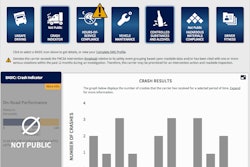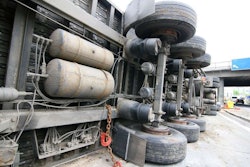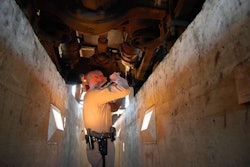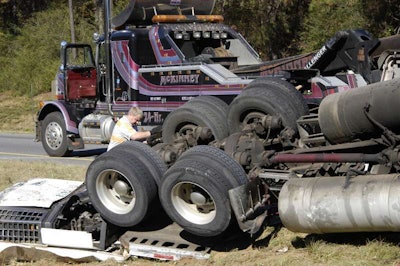
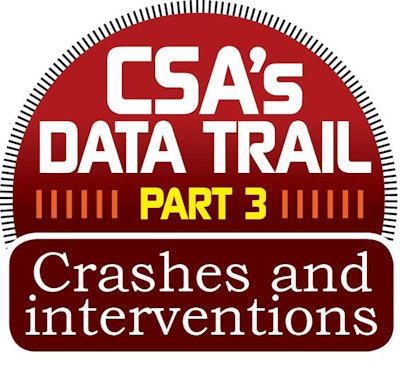 Working with CCJ and RigDig Business Intelligence, a division of Overdrive publisher Randall-Reilly Business Media, we analyzed crash data over years 2010-12, covering CSA’s first two years. Here we offer insights CSA’s effectiveness in identifying crash-prone carriers and enforcement patterns and what you can do to keep your business in the clear. Find further “Crashes and interventions” installments via this page in the coming weeks.
Working with CCJ and RigDig Business Intelligence, a division of Overdrive publisher Randall-Reilly Business Media, we analyzed crash data over years 2010-12, covering CSA’s first two years. Here we offer insights CSA’s effectiveness in identifying crash-prone carriers and enforcement patterns and what you can do to keep your business in the clear. Find further “Crashes and interventions” installments via this page in the coming weeks.Though the agency still keeps carriers’ Crash Indicator BASIC (Behavioral Analysis and Safety Improvement) percentile rankings hidden from public view, crash details are in fact available one click away from carriers’ main CSA profiles. Many industry watchers and participants view the presentation of such information in the safety-ranking context of the CSA program as the No. 1 problem the system presents for carriers. Among Overdrive readers polled earlier this year on CSA, 12 percent of respondents named the lack of crash accountability as their biggest problem with the system; it ranked third in a list of 10 problems, behind only a perceived deterioration in the driver-law enforcement relationship, and due process issues with the DataQs challenge process.

By divorcing fault from the presentation of crash information, critics say, FMCSA is doing a grave disservice to members of the public, the motor carriers the agency oversees and their drivers.
FMCSA, however, continues to insist that the Crash Indicator is its best predictor of crashes (see video at bottom for the agency’s own CSA effectiveness analysis), and that if it can prove that the CSA SMS effectively identifies unsafe motor carriers, it can help the agency prioritize where to focus its investigative resources.
“Data shows you’re likely to have more crashes if you have high scores” in the Crash Indicator as well as several other BASICs, says Bill Quade, FMCSA associate administrator for enforcement.
At a February meeting of the CSA Subcommittee to FMCSA’s Motor Carrier Safety Advisory Committee, Quade compared carriers involved in crashes to people who smoke. “Data shows that people who smoke are more likely to get cancer, but some people smoke three packs a day and never get cancer,” he said.
If many industry watchers are right, the anomalies may be less the exception than the rule regarding crash involvement. “CSA will never be tied to crash predictability,” says David Saunders, chief executive officer of Texas-headquartered Compliance Safety Systems, “The scientific data doesn’t exist.”
Discussions of how exactly to make such an accounting were prominent at February’s CSA Subcommittee meeting.
Crash reconstructionists threw cold water on carriers’ hopes for an across-the-board fault accounting in the CSA SMS. Georgia-based Jeffrey Kidd of Collision Specialists Inc. discussed his work in accident reconstruction for trucking companies during investigations and support during litigation.
Many barriers stand in the way of quick or even well-after-the-fact accounting for fault, from state incentives for towing companies to clear the roadway – thus removing key evidence – to a lack of uniformity in road officers’ reporting procedures. “There is no such thing as a uniform crash report” in the various jurisdictions across the nation, Kidd said.
Reporting of crashes covered by local jurisdictions to the federal system also can be spotty at best. On March 1, J.B. Hunt company driver M. Rick Richards was involved in a crash in City of Commerce, Calif., that ultimately was determined by the carrier to be nonpreventable. A four-wheeler in the left-turn lane adjacent to Richards tried to speed ahead and pass him but missed the mark. The crash fit the profile of a U.S. Department of Transportation-recordable crash, given that the “bumper was dragging the ground” and it involved a tow-away of his rig. Richards said he called the California Highway Patrol, “but who showed up was a City of Commerce employee,” not a full-blown police officer. “He didn’t have a gun, a Taser or a baton – he had a radio. And I don’t know if he could even write tickets, because he did not ticket the other driver.”
At the CSA Subcommittee meeting, Robert Petrancosta – vice president of safety for Con-way Freight – said that an analysis of the company’s total crashes revealed that reporting issues were responsible for about 34 percent of those crashes going unreported in the federal database.
Many officers, said Kidd, often will look only at black-and-white issues. Fault can be shared between multiple parties in an accident – particularly crashes involving more than two vehicles. Officers are taught that “if there’s a violation of the statute, make a discretionary decision on whether to issue citations, and move on. In figuring causation, however, there are shades of gray” in the multiplicity of contributing factors.
Often, fault is decided only after a lengthy court battle.
Asked by Petrancosta whether it was “safe to assume a centralized office could not correctly and accurately investigate all recordable crashes,” Kidd concurred that he would not be comfortable with such an operation. “I’ve got to put my hands on the components to truly know what happened,” he said.
A majority of the CSA Subcommittee nonetheless offered a recommendation to the full committee to exclude from the CSA SMS crashes where fault clearly was indicated on a crash report – as in many damage-only crashes, reconstructionists and others indicated. Others on the committee favored the more stringent preventable/nonpreventable crash standard, which FMCSA determines during compliance reviews of carriers where crash issues potentially could impact a carrier’s safety rating under SafeStat.
Gary Palmer, senior director of transportation for True Value Co., took exception to the need for the preventability standard to be met before a crash could be considered in a carrier’s Crash Indicator scoring. “Are we letting the exception drive the rule?” he asked, given the clear-cut nature of fault in the large majority of DOT-recordable crashes. “Because there’s some concern about [a relative few] accidents where it’s difficult to determine fault, we’re utilizing all accidents” in determining Crash Indicator scores with no fault determination.
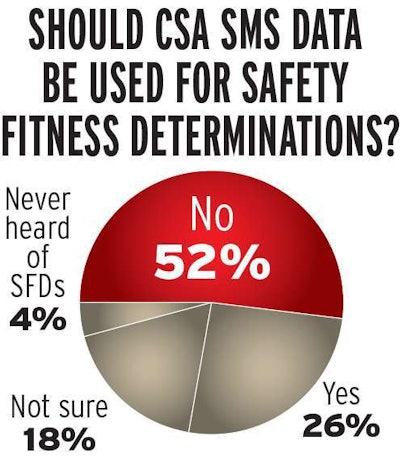 A solid majority of carrier respondents say FMCSA should not use SMS data for making carrier safety fitness determinations. FMCSA has said a formal Notice of Proposed Rulemaking to tie the SMS to carrier safety ratings can be expected this year.
A solid majority of carrier respondents say FMCSA should not use SMS data for making carrier safety fitness determinations. FMCSA has said a formal Notice of Proposed Rulemaking to tie the SMS to carrier safety ratings can be expected this year.The carrier response was to an American Transportation Research Institute survey, reported in ATRI’s December 2012 study “Compliance Safety Accountability: Evaluating a new Safety Measurement System and its implications.”
Given FMCSA’s intention to tie CSA data to a new carrier Safety Fitness Determination – a proposed rulemaking is due later this year – carriers are hoping for a suitable resolution to these issues. But some continue to worry that if the fault or preventability standard is not applied across all crashes, the door would be open for further allegations of unfair treatment. Petrancosta suggested during the CSA Subcommittee meeting that DOT should be open to potentially changing the very definition of a DOT-recordable crash.
It’s those kinds of changes, Quade suggested, that FMCSA is analyzing in its crash accountability study. Would the Crash Indicator BASIC measurements be more accurate if the agency used data only for fatalities, or fatalities and injuries? “By using a portion of the crashes, could we do better?”
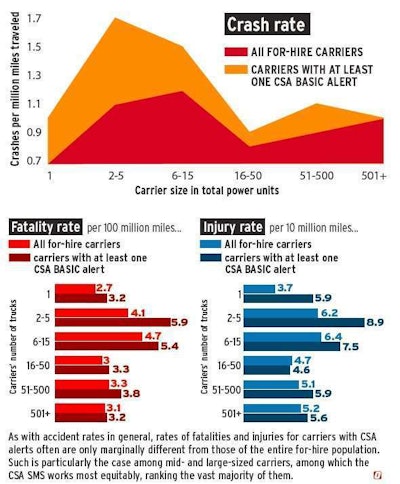
While carriers with percentile rankings above the alert threshold in one or more of the SMS BASICs do have higher DOT-recordable crash rates when compared with the entire population of for-hire carriers, the difference is smaller with larger carriers.
That’s somewhat ironic, because many observers see the CSA system working best in the largest size groupings, given that larger carriers are most likely to have enough inspection and crash data to receive rankings in the system. Yet, among the largest carriers, there is no difference between the crash rates of carriers with one or more CSA alerts and the entire group of for-hire carriers of that size.
This would imply that many large fleets without an alert have an accident risk at least as great as those with one or more alerts. Click through the chart above for a larger version.
FMCSA’s own commonly cited CSA effectiveness numbers are based on crash rates per power unit, where the agency finds a wider difference between crash rates for carriers that have alerts and those that do not. The per-power-unit measure, however, does nothing to account for exposure differences among fleets, which is why Overdrive used crashes per million miles. FMCSA specialist Courtney Stevenson, presenting at the Commercial Vehicle Safety Alliance workshop in Louisville, Ky., last month, explained the reasoning behind use of the per-power-unit figures as a recognition of the lesser quality of vehicle-miles-traveled data in the early days of CSA. Responding to a question from the audience during her presentation, Stevenson made note of the improvements that have occurred in miles data since the CSA’s beginnings in December 2010, as more and more carriers have reported miles data. Fine more from her presentation in the video below.
[youtube 7ew201HELI8 nolink]
Following “The fault handicap” in the “Crashes and Interventions” installment in the CSA’s Data Trail series is the May 3, 2013, analysis of FMCSA’s “high-risk carrier” definition and new quick-strike intervention teams — read more via this link to “Blitzkrieg probes coming to trucking.”

